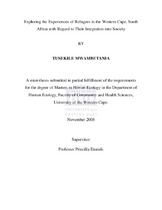| dc.description.abstract | Forced migration is a serious problem worldwide and it is always associated with political, ethnic or violent conflict accompanied by intensive human rights abuses. Africa has the largest number of refugees (more than 15 million) compared to other regions. Many Africans are forced to abandon their homes and go into exile because of ethnic conflicts, civil wars and ongoing violence which in turn cause millions of refugees to be separated from their families and loved ones. The aim of this study was to explore the experiences of refugees in the Western Cape province with regard to their integration into the society. The objectives of the study were (1) to explore the experiences of refugees in the Western Cape, South Africa; (2) to explore the link between their experiences and integration into the South African society. This research employed an exploratory study design that was conducted qualitatively.
Semi-structured interviews with refugees were conducted with the aim of understanding personal experiences and challenges that refugees face. The population of the study was refugees who visited two of the refugee centres in Cape Town. A purposive sampling method was used. A total of ten refugees were interviewed and a questionnaire was used to collect the demographic characteristics of the participants. Data was analyzed by thematic analysis method where the data was coded and categorized and discussed according to the aims and objectives of the study in relation to previous studies. The
major themes identified were employment and financial independence, education, health, language, culture, emotional sustainability, support and xenophobia. The results of the study were made available to refugees and the centres participating in the study. The main findings were that most refugees are educated and have skills and relevant work experience yet they feel dissatisfied in their current work place because they are underutilized and not using their skills optimally. Emotional sustainability and integration is often challenged and refugees rely on spiritual faith to face their hardships.
Issues of cultural differences and language gaps contribute to the lack of well being. Accessing treatment in public health care facilities was described as inadequate by refugees. Xenophobia contributes to the problems of integration. Participants felt to some extent their difficulties could be reduced if proper intervention could be made by the government in terms of support. The main recommendations resulting from the research were 1) government and non governmental institutions should work together to improve services delivery to refugees for integration purposes; 2) policy intervention is
needed from the government to address the problems of refugees and 3) nongovernmental organizations should extend their services to community development to improve the interaction of refugees in adopted countries. | en_US |

